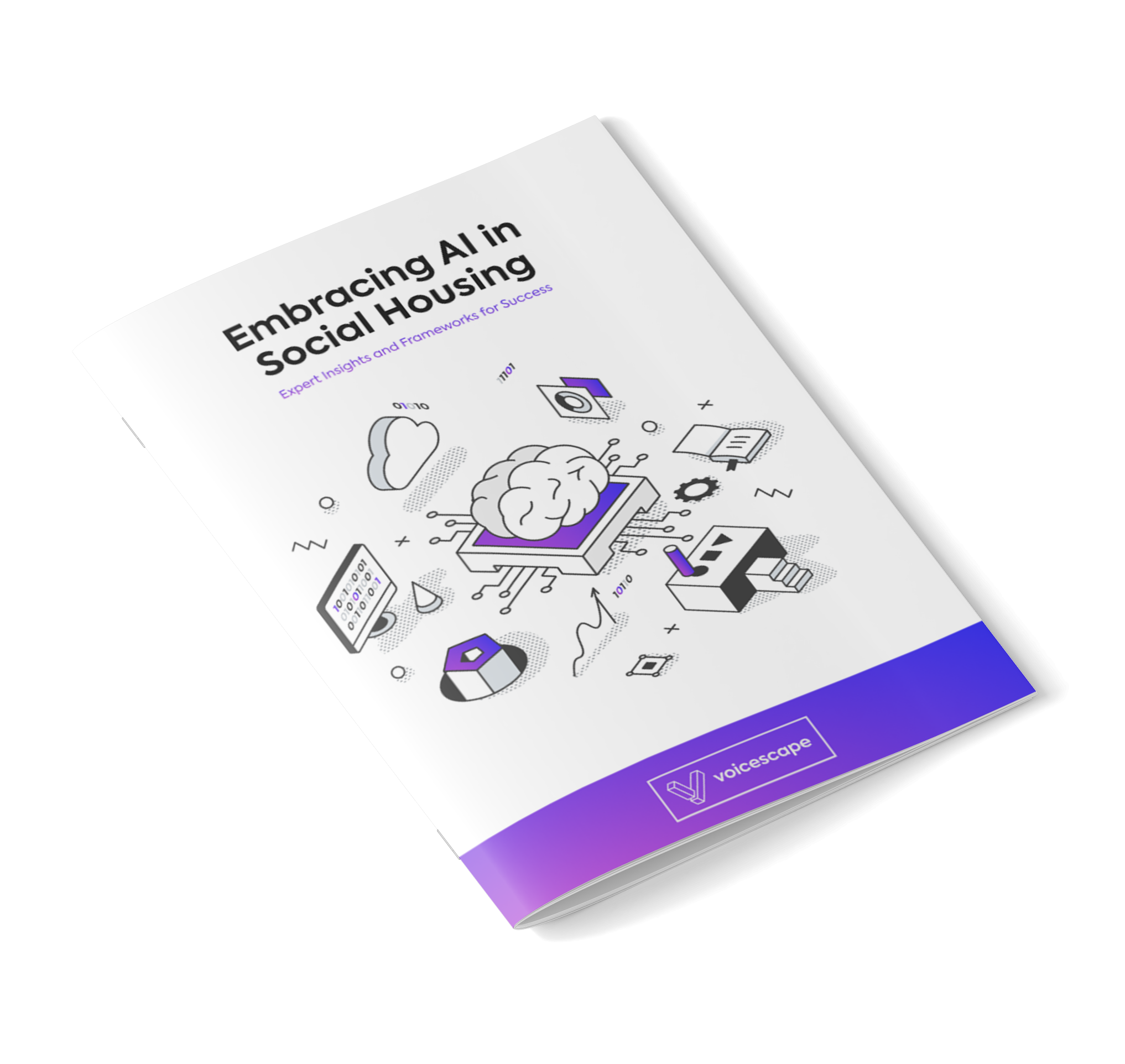What potential does AI have to enable social landlords to better analyse tenant opinions and satisfaction to predict future demand and preferences around services?
The use of AI in gaining insights into customer opinions is now standard practice in a range of businesses. In particular, the use of sentiment analysis (SA) is wide spread in a range of different commercial businesses from banking to retail. Typically SA works at scale via the use of Natural Language Processing to collect and agglomerate customer opinions so that general themes can be identified. Within Social Housing, SA analysis automatically use tenant feedback from various communication channels to gauge overall satisfaction and identify areas needing improvement. This real-time feedback can alert landlords to issues as they arise, allowing for quicker resolution and improving tenant relations.
In addition to SA, AI can provide predictive analytics to predict future tenant demands and trends by analysing past and current data. This predictive capability can help social landlords in strategic planning, ensuring that they are prepared to meet future needs, such as preferences for green spaces, community facilities, or digital services.
AI can also be used to automate routine tasks and processes which would then free up Social Landlords to focus on higher level strategic initiatives, strategy or solving more difficult problems to further help tenants.
Finally, AI-powered chatbots and virtual assistants can provide tenants with 24/7 support, answering queries and collecting feedback. This constant communication channel can enhance tenant satisfaction and provide landlords with valuable insights into tenant needs and concerns. The utility of chatbots has greatly increased in the past 5 years with the success of generate models such as Chat-GPT. There are an increasing number of pre-trained models which can be relatively inexpensively fine-tuned to a specific domain (such as social housing management).
If social housing providers can understand tenants' opinions, satisfaction and suggestions quicker or more efficiently, can this then be operationalised to improve services using AI?
There are two obvious ways to operationalise. The first is using AI to automate responses to tenants. This would allow for a fast and personal response to any tenant at anytime (and in particular outside of the normal working day). The second is the use of AI to predict and respond to issues before they become a problem. Machine Learning is good at making predictions based on data – which could be from many different sources – and this would allow for timely interventions.
What types of insights and sentiments do you think social landlords should be looking to analyse through AI analysis?
In terms of individual tenants, the obvious insights are around sentiment analysis and maximising tenant satisfaction which hopefully results in a productive long-term relationship between landlord and tenant. Collectively, AI can help social housing providers to identify common interests and needs among tenants, facilitating the development of community programs or initiatives that foster social cohesion and integration.
How can we make sure that AI simultaneously learns from behavioural patterns while also maintaining / protecting the rights and privacy of the individuals whose actions it learns from? Also, how do we ensure sentiment and theme analysis does not misunderstand people’s thoughts and feelings and categorise them in a way that isn’t correct?
Privacy has become a big issue within Machine Learning and within the AI community there is a growing need to develop a methodological framework for ensuring privacy is protected – especially in the area of AI models for healthcare where ethical issues such as patient confidentiality are paramount.
For example, one area is federated learning which is a machine learning approach that enables models to be trained across multiple decentralised devices or servers holding local data samples, without needing to exchange them. This technique is particularly useful for preserving privacy and reducing the need to transfer large amounts of data to a central location. For example, federated learning might be done across IoT devices or smart phones.
How can organisations in the social housing sector balance the use of AI to support their business objectives / requirements with that of empowering and protecting residents?
This is a difficult question since there is always a balance between business sustainability (or profit) and tenant protection. I think at a minimum it is ensuring that any use of AI follows best practice by capturing the spirit rather than just the letter of legal frameworks such as the European AI act (https://digital-strategy.ec.europa.eu/en/policies/regulatory-framework-ai) I think we’ll see far more of these frameworks being proposed by government.
What would you consider to be the most significant ethical issues when it comes to using AI in social housing? And how can such issues be guarded against and overcome?
Unfair bias is an obvious risk. This can be mitigated by the use of explainable AI (so that any decision can be justified) and human-in-the-loop frameworks where there is always a human element involved in decision making. Data protection is also a danger – and the need to ensure that tenants have a right to privacy.
In general, do you feel social housing is a sector that is particularly well / badly suited to AI and the application of AI into different services?
There is great potential in the use of AI within the social housing domain given the complexity of the domain with multiple sources (and types) of data and the increase in the use of technology in housing in general through the use of Internet of Things (IoT) and smart devices (e.g. mobile phones etc.).
What do you feel is the overall opportunity for AI to help overcome the significant issues facing the sector?
The opportunity is for AI to both streamline and improve the level of provision within the sector so that social housing is both better value and of a higher standard. AI should be viewed as an enabling technology which improves provision rather than a threat to human individuality or privacy.
What role should other stakeholders, particularly residents, have in monitoring and policing the use of AI in the social housing sector?
All stakeholders should be equipped to understand how AI is being used and its potential and limitations. This is mostly through education (and true of wider society).
There should be clear and accessible feedback mechanisms open to all stake holders – ideally alternatives to AI mediated feedback mechanisms (e.g. even if this is just a accessible phone number for a human to speak to rather than computer).
There should be a framework which facilitates regular audits of the AI by an independent committee of humans and ideally this committee should be both diverse and representative.
What wider advancements in AI are on the horizon? Could these have any specific relevance to the social housing sector?
AI (and in particular generative AI) will further improve over the next five years. I suspect we’ll see ever increasingly human-like avatars and chatbots (with multi-lingual speech to speech functionality) to the point that distinguishing between human and AI will become a challenge.
We haven’t made such progress within physical computing such as robotics or autonomous vehicles but I think we’ll see advancements within the next ten years. (Already we are seeing robotic delivery in some towns, including Oxford. I think some of the bigger challenges are societal rather than technological here).
If this is something you would like to read more about, download the full FREE whitepaper here.
Get in touch?
Want to see how Voicescape technology could help your housing association? Get in touch






